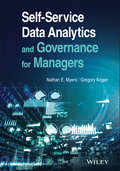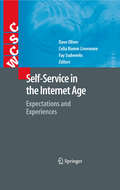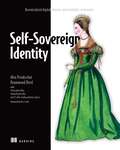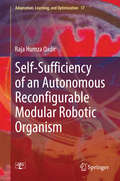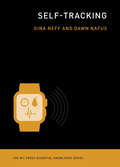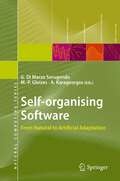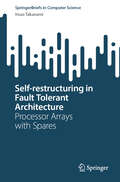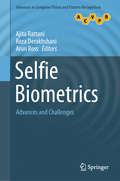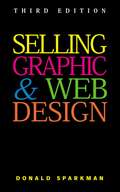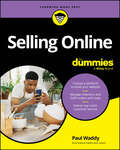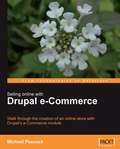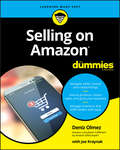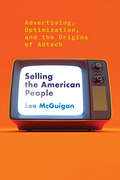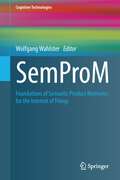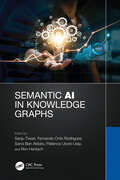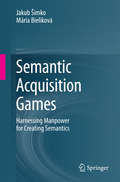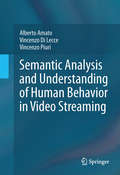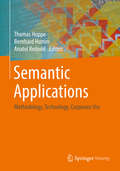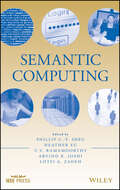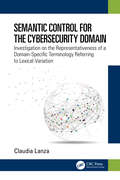- Table View
- List View
Self-Service Data Analytics and Governance for Managers
by Nathan E. Myers Gregory KoganProject governance, investment governance, and risk governance precepts are woven together in Self-Service Data Analytics and Governance for Managers, equipping managers to structure the inevitable chaos that can result as end-users take matters into their own hands Motivated by the promise of control and efficiency benefits, the widespread adoption of data analytics tools has created a new fast-moving environment of digital transformation in the finance, accounting, and operations world, where entire functions spend their days processing in spreadsheets. With the decentralization of application development as users perform their own analysis on data sets and automate spreadsheet processing without the involvement of IT, governance must be revisited to maintain process control in the new environment. In this book, emergent technologies that have given rise to data analytics and which form the evolving backdrop for digital transformation are introduced and explained, and prominent data analytics tools and capabilities will be demonstrated based on real world scenarios. The authors will provide a much-needed process discovery methodology describing how to survey the processing landscape to identify opportunities to deploy these capabilities. Perhaps most importantly, the authors will digest the mature existing data governance, IT governance, and model governance frameworks, but demonstrate that they do not comprehensively cover the full suite of data analytics builds, leaving a considerable governance gap. This book is meant to fill the gap and provide the reader with a fit-for-purpose and actionable governance framework to protect the value created by analytics deployment at scale. Project governance, investment governance, and risk governance precepts will be woven together to equip managers to structure the inevitable chaos that can result as end-users take matters into their own hands.
Self-Service in the Internet Age
by David Oliver Celia Romm Livermore Fay SudweeksThe Internet has emerged as a network which enables a vast range of interactions between businesses and government organizations and individuals. These interactions are classified as B2C (business to consumer), B2B (business to business) and C2C (consumer to consumer) creating ever growing forms of Internet connectedness. This connectedness enables a vast range of self-service opportunities via the Internet. Self-Service in the Internet Age explores attitudes and behaviors to this new form of self-service provision. It focuses on how services are used and viewed by those who choose to use or not use them in a variety of contexts such as personal banking, shopping, travel, education, and health.
Self-Sovereign Identity: Decentralized Digital Identity And Verifiable Credentials
by Alex Preukschat Drummond ReedIn Self-Sovereign Identity: Decentralized digital identity and verifiable credentials, you&’ll learn how SSI empowers us to receive digitally-signed credentials, store them in private wallets, and securely prove our online identities.Summary In a world of changing privacy regulations, identity theft, and online anonymity, identity is a precious and complex concept. Self-Sovereign Identity (SSI) is a set of technologies that move control of digital identity from third party &“identity providers&” directly to individuals, and it promises to be one of the most important trends for the coming decades. Now in Self-Sovereign Identity, privacy and personal data experts Drummond Reed and Alex Preukschat lay out a roadmap for a future of personal sovereignty powered by the Blockchain and cryptography. Cutting through the technical jargon with dozens of practical use cases from experts across all major industries, it presents a clear and compelling argument for why SSI is a paradigm shift, and shows how you can be ready to be prepared for it. About the technology Trust on the internet is at an all-time low. Large corporations and institutions control our personal data because we&’ve never had a simple, safe, strong way to prove who we are online. Self-sovereign identity (SSI) changes all that. About the book In Self-Sovereign Identity: Decentralized digital identity and verifiable credentials, you&’ll learn how SSI empowers us to receive digitally-signed credentials, store them in private wallets, and securely prove our online identities. It combines a clear, jargon-free introduction to this blockchain-inspired paradigm shift with interesting essays written by its leading practitioners. Whether for property transfer, ebanking, frictionless travel, or personalized services, the SSI model for digital trust will reshape our collective future. What's inside The architecture of SSI software and services The technical, legal, and governance concepts behind SSI How SSI affects global business industry-by-industry Emerging standards for SSI About the reader For technology and business readers. No prior SSI, cryptography, or blockchain experience required. About the authors Drummond Reed is the Chief Trust Officer at Evernym, a technology leader in SSI. Alex Preukschat is the co-founder of SSIMeetup.org and AlianzaBlockchain.org. Table of Contents PART 1: AN INTRODUCTION TO SSI 1 Why the internet is missing an identity layer—and why SSI can finally provide one 2 The basic building blocks of SSI 3 Example scenarios showing how SSI works 4 SSI Scorecard: Major features and benefits of SSI PART 2: SSI TECHNOLOGY 5 SSI architecture: The big picture 6 Basic cryptography techniques for SSI 7 Verifiable credentials 8 Decentralized identifiers 9 Digital wallets and digital agents 10 Decentralized key management 11 SSI governance frameworks PART 3: DECENTRALIZATION AS A MODEL FOR LIFE 12 How open source software helps you control your self-sovereign identity 13 Cypherpunks: The origin of decentralization 14 Decentralized identity for a peaceful society 15 Belief systems as drivers for technology choices in decentralization 16 The origins of the SSI community 17 Identity is money PART 4: HOW SSI WILL CHANGE YOUR BUSINESS 18 Explaining the value of SSI to business 19 The Internet of Things opportunity 20 Animal care and guardianship just became crystal clear 21 Open democracy, voting, and SSI 22 Healthcare supply chain powered by SSI 23 Canada: Enabling self-sovereign identity 24 From eIDAS to SSI in the European Union
Self-Sufficiency of an Autonomous Reconfigurable Modular Robotic Organism
by Raja Humza QadirThis book describes how the principle of self-sufficiency can be applied to a reconfigurable modular robotic organism. It shows the design considerations for a novel REPLICATOR robotic platform, both hardware and software, featuring the behavioral characteristics of social insect colonies. Following a comprehensive overview of some of the bio-inspired techniques already available, and of the state-of-the-art in re-configurable modular robotic systems, the book presents a novel power management system with fault-tolerant energy sharing, as well as its implementation in the REPLICATOR robotic modules. In addition, the book discusses, for the first time, the concept of "artificial energy homeostasis" in the context of a modular robotic organism, and shows its verification on a custom-designed simulation framework in different dynamic power distribution and fault tolerance scenarios. This book offers an ideal reference guide for both hardware engineers and software developers involved in the design and implementation of autonomous robotic systems.
Self-Tracking: The Mit Press Essential Knowledge Series (The MIT Press Essential Knowledge series)
by Gina Neff Dawn NafusWhat happens when people turn their everyday experience into data: an introduction to the essential ideas and key challenges of self-tracking.People keep track. In the eighteenth century, Benjamin Franklin kept charts of time spent and virtues lived up to. Today, people use technology to self-track: hours slept, steps taken, calories consumed, medications administered. Ninety million wearable sensors were shipped in 2014 to help us gather data about our lives. This book examines how people record, analyze, and reflect on this data, looking at the tools they use and the communities they become part of. Gina Neff and Dawn Nafus describe what happens when people turn their everyday experience—in particular, health and wellness-related experience—into data, and offer an introduction to the essential ideas and key challenges of using these technologies. They consider self-tracking as a social and cultural phenomenon, describing not only the use of data as a kind of mirror of the self but also how this enables people to connect to, and learn from, others.Neff and Nafus consider what's at stake: who wants our data and why; the practices of serious self-tracking enthusiasts; the design of commercial self-tracking technology; and how self-tracking can fill gaps in the healthcare system. Today, no one can lead an entirely untracked life. Neff and Nafus show us how to use data in a way that empowers and educates.
Self-organising Software
by Marie-Pierre Gleizes Anthony Karageorgos Giovanna Di Marzo SerugendoSelf-organisation, self-regulation, self-repair and self-maintenance are promising conceptual approaches for dealing with complex distributed interactive software and information-handling systems. Self-organising applications dynamically change their functionality and structure without direct user intervention, responding to changes in requirements and the environment. This is the first book to offer an integrated view of self-organisation technologies applied to distributed systems, particularly focusing on multiagent systems. The editors developed this integrated book with three aims: to explain self-organisation concepts and principles, using clear definitions and a strong theoretical background; to examine how self-organising behaviour can be modelled, analysed and systematically engineered into agent behaviour; and to assess the types of problems that can be solved using self-organising multiagent systems. The book comprises chapters covering all three dimensions, synthesising up-to-date research work and the latest technologies and applications. The book offers dedicated chapters on concepts such as self-organisation, emergence in natural systems, software agents, stigmergy, gossip, cooperation and immune systems. The book then explains how to engineer artificial self-organising software, in particular it examines methodologies and middleware infrastructures. Finally, the book presents diverse applications of self-organising software, such as constraint satisfaction, trust management, image recognition and networking. The book will be of interest to researchers working on emergent phenomena and adaptive systems. It will also be suitable for use as a graduate textbook, with chapter summaries and exercises, and an accompanying website that includes teaching slides, exercise solutions and research project outlines. Self-organisation, self-regulation, self-repair and self-maintenance are promising conceptual approaches for dealing with complex distributed interactive software and information-handling systems. Self-organising applications dynamically change their functionality and structure without direct user intervention, responding to changes in requirements and the environment. This is the first book to offer an integrated view of self-organisation technologies applied to distributed systems, particularly focusing on multiagent systems. The editors developed this integrated book with three aims: to explain self-organisation concepts and principles, using clear definitions and a strong theoretical background; to examine how self-organising behaviour can be modelled, analysed and systematically engineered into agent behaviour; and to assess the types of problems that can be solved using self-organising multiagent systems. The book comprises chapters covering all three dimensions, synthesising up-to-date research work and the latest technologies and applications. The book offers dedicated chapters on concepts such as self-organisation, emergence in natural systems, software agents, stigmergy, gossip, cooperation and immune systems. The book then explains how to engineer artificial self-organising software, in particular it examines methodologies and middleware infrastructures. Finally, the book presents diverse applications of self-organising software, such as constraint satisfaction, trust management, image recognition and networking. The book will be of interest to researchers working on emergent phenomena and adaptive systems. It will also be suitable for use as a graduate textbook, with chapter summaries and exercises, and an accompanying website that includes teaching slides, exercise solutions and research project outlines.
Self-restructuring in Fault Tolerant Architecture: Processor Arrays with Spares (SpringerBriefs in Computer Science)
by Itsuo TakanamiRecently, high-speed and high-quality technologies for processing many kinds of information have become essential and will become more and more necessary in the future. For such needs, parallel computer systems composed of many processing elements (PEs) are used and it is important to make high reliable systems which is called "fault-tolerant computer systems". As VLSI technology has developed, the realization of parallel computer systems using multi-chip module (MCM) or wafer scale integration (WSI) has been considered so as to enhance the speed of the computers, decrease energy consumption and sizes, and so on. In such a realization, entire or significant parts of PEs and connections among them are connected or implemented on a board or wafer. Therefore, the reliability and/or yield of the system may become drastically low if there is no strategy for coping with faults or defects. In realizing such systems as well as parallel computer systems, in order to restore the correct computation capabilities of the systems with faults, it must be reconfigured appropriately using spare PEs so that the faulty PEs are eliminated from the computation paths by replacing faulty PEs with healthy spare PEs and the remaining healthy PEs maintain correct logical connectivity among them. Various strategies to reconfigure a faulty physical system into a fault-free target logical system are described in the literature. Some of these techniques employ very powerful reconfiguring systems that can repair a faulty processor array with almost certainty, even in the presence of clusters of multiple faults. However, the key limitation of these techniques is that they are executed in software programs to run on an external host computer and they cannot be designed and implemented efficiently within a system. If a faulty system can be self-reconfigured by a built-in circuit or network, the system down time is significantly reduced. Furthermore, the system will become more reliable when it is used in such environments that the fault information cannot be monitored externally and manual maintenance operations are difficult. This book concerns fault-tolerant systems consisting of many PEs, mainly mesh-connected processor arrays. A mesh-connected processor array is a kind of form of massively parallel computing systems which consist of hundreds of PEs and have regular and modular structures, small wiring length between PEs, and high scalabilities. Here, self-reconfiguration of processor systems with spares using built-in digital circuits are focused on and spare arrangements together with networks connecting among PEs and reconfiguration algorithms with digital circuits are described, considering the number of spares, reconfiguration algorithms and their hardware realizations (built-in circuits), etc. where spares are arranged on the sides or diagonal of arrays. The effectiveness of the systems is evaluated in terms of the survival rates (successfully reconfigured rates) for the number of faults, and the array reliabilities (successfully reconfigured probabilities under the condition that each PE is equally reliable).
Selfie Biometrics: Advances and Challenges (Advances in Computer Vision and Pattern Recognition)
by Ajita Rattani Reza Derakhshani Arun RossThis book highlights the field of selfie biometrics, providing a clear overview and presenting recent advances and challenges. It also discusses numerous selfie authentication techniques on mobile devices. Biometric authentication using mobile devices is becoming a convenient and important means of verifying identity for secured access and services such as telebanking and electronic transactions. In this context, face and ocular biometrics in the visible spectrum has gained increased attention from the research community. However, device mobility and operation in uncontrolled environments mean that facial and ocular images captured with mobile devices exhibit substantial degradation as a result of adverse lighting conditions, specular reflections and motion and defocus blur. In addition, low spatial resolution and the small sensor of front-facing mobile cameras further degrade the sample quality, reducing the recognition accuracy of face and ocular recognition technology when integrated into smartphones. Presenting the state of the art in mobile biometric research and technology, and offering an overview of the potential problems in real-time integration of biometrics in mobile devices, this book is a valuable resource for final-year undergraduate students, postgraduate students, engineers, researchers and academics in various fields of computer engineering.
Selfie Made: Your Ultimate Guide to Social Media Stardom
by Meridith Valiando RojasHOW DO I MAKE IT BIG ON SOCIAL MEDIA? WHAT IS MY STORY—AND WHO IS MY AUDIENCE? WHAT CONTENT SHOULD I POST TO ACHIEVE #SUCCESS? HOW DO I GO VIRAL…OR HOW LONG WILL IT TAKE ME TO GET NOTICED?Selfie Made is a one-of-a-kind guide to creating a digital identity, finding an audience, and building a powerful brand—your own!—on the Internet. Whether you want to be in front of or behind the camera, produce click-worthy content or start your own business, this book is the place to begin. Written by Meridith Valiando Rojas, the hugely successful (and super friendly IRL) founder of DigiTour who has worked with every major star from YouTube to Musical.ly, this collection of personal anecdotes and professional advice, tricks of the trade and behind-the-screen secrets, will give you everything you need for your social media toolkit.Here, you’ll get to know the true stories behind some of today’s most successful multimedia stars and influencers, including:Max And Harvey - Blake Gray - Danielle CohnBryce Xavier - Lauren Godwin - Nathan TriskaTrevor Moran - Messy Monday - Simon Britton…and others who learned the ropes, beat the odds, and took social media by storm. And so can you!
Sell Online Like a Creative Genius: A Guide for Artists, Entrepreneurs, Inventors, and Kindred Spirits (Like a Creative Genius #1)
by Brainard CareyHow to sell art or anything else online without leaving your home. Whether you’re selling original artwork, jewelry, or a unique product, this is the book for you. Brainard Carey offers advice with solid examples of how building an online business is something every creative person can pursue. Carey draws from his extensive experience and interviews with others to show artists and creative people how to sell their work independently and efficiently. Readers will learn how to establish an online store, develop a presence, promote their goods, and reach customers. Chapter topics include: Designing a website or profile on an existing site Effective marketing strategies Creative ways to advertise your product Building your social media following Finding new customers Real examples of artists and entrepreneurs who succeeded in selling their work online And much more With chapters divided between practical how-tos and case studies, Sell Online Like a Creative Genius™, offers readers both instructive and demonstrative lessons in making their small online business a reality. Everyone can do it with the right tools, and Carey offers an insider’s guide to an otherwise daunting process.
Selling Graphic and Web Design
by Donald SparkmanExpert guidance on selling graphic design, in print and online. Attract today's savvy design clients! A veteran designer who turned his small business into a multimillion-dollar new-media company shares his strategies for success in this new edition of the acclaimed Selling Graphic and Web Design. Donald Sparkman's approach blurs the lines between graphic design, web design, and marketing by building strategic partnerships and thinking outside the box. No-nonsense advice for writing proposals and offering the right design solutions, plus information on providing services that fit a client's needs and budget, have made this book indispensable. Now, in this revised and expanded version, leading Internet designers share strategies on effective marketing for the web, including pricing, billing, portfolios, ethics, brand design, web content management, brand law, and much more. Trusted advice and the latest strategies combine to make Selling Graphic and Web Design a great one-stop resource for designers in every field. New edition of a classic Up-to-the-minute advice on selling to internet clients Get the top clients and keep them
Selling IT: The Science of Selling, Buying, and Deal-Making
by Amitabh Satyam Sandip Mukhopadhyay Srinivas PingaliInformation technology (IT) is an essential core of the economy today. Corporations and governments worldwide rely on it to drive their core strategy and develop and execute business models. Amounting to over 3.7 trillion US dollars of worldwide spending, the growing significance of the IT industry in the global economy is now well established. Hence, it is crucial to understand the marketplace within which it exists, and this book presents a systematic analysis of the processes, techniques, and methods involved in IT sales and marketing. In Selling IT, the book: Integrates a large IT provider’s selling process with the enterprise user’s IT buying process to highlight the nuances of selling, marketing, and developing IT solutions that create value for customers. Discusses various key concepts such as value-based IT selling, business case for IT acquisition, vendor evaluation and management, account and customer relationship management, customer segmentation, and techniques for customer acquisition and retention. Analyses the challenges and opportunities involved in selling digital IT and examines the evolution of jobs and careers based on the changed IT landscape. Includes lesson plans, case studies, and chapter-wise practice questions to support teaching and learning. The book boasts a robust theoretical foundation supported by a clear exposition of concepts and management theories. It will be of benefit to professionals using organisation-mandated selling processes. Young executives with a technology background looking for a sales and marketing career in the IT industry can also effectively use this book. It will also be an essential read for scholars and researchers in B2B marketing, IT consulting, technology sales, and digital transformation.
Selling Online For Dummies
by Paul WaddyTransform your ecommerce ideas into profitable reality with this page-turning new handbook Online shopping is more popular than ever, and ecommerce is now a multi-billion-dollar industry. Isn’t it time for you to claim your share? If you’ve been wondering how to start an online business, or get your current business thriving online, this comprehensive guide shares everything you need to know. In Selling Online For Dummies, ecommerce advisor and online shopping guru Paul Waddy shows you exactly how to get started in setting up your online shop. With an expert’s eye for business, and an easy-to-understand take on the technical stuff, Waddy takes you from digital start to finish as he discusses topics like: Finding hot products to sell, working with suppliers and managing your inventory Building a website from scratch by choosing the right developer and platform Marketing your site with smart SEO, paid ads, and organic marketing strategies on Google, Instagram, Facebook and TikTok Understanding the user experience and creating happy, loyal customers Dealing with payments, currencies, taxes and duties It’s time to take advantage of the commercial opportunities waiting for you online. Selling Online For Dummies is a must-read that will help you turn your great idea from virtual to reality.
Selling Online with Drupal e-Commerce
by Michael PeacockThe book starts with the basics of Drupal and then steps you through the creation of an online shop, exploring Drupal further as needed. Only the features of Drupal relevant to the e-commerce application will be covered. Written in a straightforward, easy-to-understand manner, the book provides the essentials of getting your e-commerce website up and running with Drupal. This book is for people who want to start selling online as quickly as possible, and want to see how to use the proven Drupal platform to achieve this. The book is ideal for use in a small business with only basic in-house technical skills. It will also be useful for developers who not only want to create an e-commerce site, but also want a CMS platform for expanding the site in the future. No prior knowledge of Drupal is required. No PHP experience is expected, although it will be useful. Basic knowledge of e-commerce will also be useful, although the main concepts are introduced and covered as required.
Selling Used Books Online: The Complete Guide to Bookselling at Amazon's Marketplace and Other Online Sites
by Stephen Windwalker Genevieve KazdinDiscusses how to get started selling used books online, with an emphasis on amazon.com. Also covers the basics of starting and running a business.
Selling on Amazon For Dummies
by Joseph Kraynak Deniz OlmezSell on Amazon and Make Them Do the Heavy Lifting Selling on Amazon has become one of the most popular ways to earn income online. In fact, there are over 2 million people selling on Amazon worldwide. Amazon allows any business, no matter how small, to get their products in front of millions of customers and take advantage of the largest fulfillment network in the world. It also allows businesses to leverage their first-class customer service and storage capabilities. Selling on Amazon For Dummies walks owners through the process of building a business on Amazon—a business that can be built almost anywhere in the world, as long as you have access to a computer and the internet. The basics of selling on Amazon Using FBA Getting started Deciding what to sell Conducting product research Finding your way around Seller Central Product sourcing, shipping and returns, Amazon subscription, fees, sales tax, and more How to earn ROIs (Returns on Your Investments) Selling on Amazon provides the strategies, tools, and education you need, including turnkey solutions focused on sales, marketing, branding, and marketplace development to analyze and maximize opportunities.
Selling the American People: Advertising, Optimization, and the Origins of Adtech
by Lee McGuiganHow marketers learned to dream of optimization and speak in the idiom of management science well before the widespread use of the Internet.Algorithms, data extraction, digital marketers monetizing "eyeballs": these all seem like such recent features of our lives. And yet, Lee McGuigan tells us in this eye-opening book, digital advertising was well underway before the widespread use of the Internet. Explaining how marketers have brandished the tools of automation and management science to exploit new profit opportunities, Selling the American People traces data-driven surveillance all the way back to the 1950s, when the computerization of the advertising business began to blend science, technology, and calculative cultures in an ideology of optimization. With that ideology came adtech, a major infrastructure of digital capitalism.To help make sense of today's attention merchants and choice architects, McGuigan explores a few key questions: How did technical experts working at the intersection of data processing and management sciences come to command the center of gravity in the advertising and media industries? How did their ambition to remake marketing through mathematical optimization shape and reflect developments in digital technology? In short, where did adtech come from, and how did data-driven marketing come to mediate the daily encounters of people, products, and public spheres? His answers show how the advertising industry's efforts to bend information technologies toward its dream of efficiency and rational management helped to make "surveillance capitalism" one of the defining experiences of public life.
Selling the Dream: How to Promote Your Product, Company, or Ideas - And Make A Difference - Using Everyday Evangelism
by Guy KawasakiFormer product manager for Apple Computers, Guy Kawasaki, discusses a new selling technique he names "evangelism."
SemProM
by Wolfgang WahlsterThe development of low-cost, compact digital storage, sensors and radio modules allows us to embed digital memories into products to record key events. Such computationally enhanced products can perceive and control their environment, analyze their observations, and communicate with other smart objects and human users. Digital product memories (DPMs) will play a key role in the upcoming fourth industrial revolution based on cyber-physical production systems, resulting in improvements in traceability and quality assurance, more efficient and flexible production, logistics, customization, and recycling, and better information for the consumer. SemProM was a major industrial and academic research project that examined all aspects of the design and implementation of semantic product memories, and this book is a comprehensive assessment of the results achieved. The introductory chapters explain the fundamental ideas and the organization of the related project, while the remaining parts explain how to build, model and process DPMs, multimodal interaction using them, and selected applications. This work is inherently multidisciplinary and the related ideas, technologies, and implementations draw on results in fields such as semantic technologies, machine-to-machine communication, intelligent sensor networks, instrumented environments, embedded systems, smart objects, RFID technology, security, and privacy. The contributing authors are leading scientists and engineers, representing key academic teams and companies. The book explains successful deployment in applications such as manufacturing, green logistics, retail, healthcare, and food distribution, and it will be of value to both researchers and practitioners.
Semantic AI in Knowledge Graphs
by Sanju Tiwari Fernando Ortíz-Rodriguez Sarra Ben Abbés Patience Usoro Usip Rim HantachRecent combinations of semantic technology and artificial intelligence (AI) present new techniques to build intelligent systems that identify more precise results. Semantic AI in Knowledge Graphs locates itself at the forefront of this novel development, uncovering the role of machine learning to extend the knowledge graphs by graph mapping or corpus-based ontology learning. Securing efficient results via the combination of symbolic AI and statistical AI such as entity extraction based on machine learning, text mining methods, semantic knowledge graphs, and related reasoning power, this book is the first of its kind to explore semantic AI and knowledge graphs. A range of topics are covered, from neuro-symbolic AI, explainable AI and deep learning to knowledge discovery and mining, and knowledge representation and reasoning. A trailblazing exploration of semantic AI in knowledge graphs, this book is a significant contribution to both researchers in the field of AI and data mining as well as beginner academicians.
Semantic Acquisition Games
by Jakub Šimko Mária BielikováMany applications depend on the effective acquisition of semantic metadata, and this state-of-the-art volume provides extensive coverage of the field of semantics acquisition games (SAGs). SAGs are a part of the crowdsourcing approach family and the authors analyze their role as tools for acquisition of resource metadata and domain models. Three case studies of SAG-based semantics acquisition methods are shown, along with other existing SAGs: 1. the Little Search Game - a search query formulation game using negative search, serving for acquisition of lightweight semantics. 2. the PexAce - a card game acquiring annotations to images. 3. the CityLights - a SAG used for validation of music metadata. The authors also look at the SAGs from their design perspectives covering SAG design issues and existing patterns, including several novel patterns. For solving cold start problems, a "helper artifact" scheme is presented, and for dealing with malicious player behavior, a posteriori cheating detection scheme is given. The book also presents methods for assessing information about player expertise, which can be used to make SAGs more effective in terms of useful output.
Semantic Analysis and Understanding of Human Behavior in Video Streaming
by Vincenzo Piuri Alberto Amato Vincenzo Di LecceSemantic Analysis and Understanding of Human Behaviour in Video Streaming investigates the semantic analysis of the human behaviour captured by video streaming, and introduces both theoretical and technological points of view. Video analysis based on the semantic content is in fact still an open issue for the computer vision research community, especially when real-time analysis of complex scenes is concerned. This book explores an innovative, original approach to human behaviour analysis and understanding by using the syntactical symbolic analysis of images and video streaming described by means of strings of symbols. A symbol is associated to each area of the analyzed scene. When a moving object enters an area, the corresponding symbol is appended to the string describing the motion. This approach allows for characterizing the motion of a moving object with a word composed by symbols. By studying and classifying these words we can categorize and understand the various behaviours. The main advantage of this approach lies in the simplicity of the scene and motion descriptions so that the behaviour analysis will have limited computational complexity due to the intrinsic nature both of the representations and the related operations used to manipulate them. Besides, the structure of the representations is well suited for possible parallel processing, thus allowing for speeding up the analysis when appropriate hardware architectures are used. A new methodology for design systems for hierarchical high semantic level analysis of video streaming in narrow domains is also proposed. Guidelines to design your own system are provided in this book. Designed for practitioners, computer scientists and engineers working within the fields of human computer interaction, surveillance, image processing and computer vision, this book can also be used as secondary text book for advanced-level students in computer science and engineering.
Semantic Applications: Methodology, Technology, Corporate Use
by Bernhard Humm Anatol Reibold Thomas HoppeThis book describes methodologies for developing semantic applications. Semantic applications are software applications which explicitly or implicitly use the semantics, i.e. the meaning of a domain terminology, in order to improve usability, correctness, and completeness. An example is semantic search, where synonyms and related terms are used for enriching the results of a simple text-based search. Ontologies, thesauri or controlled vocabularies are the centerpiece of semantic applications. The book includes technological and architectural best practices for corporate use. The authors are experts from industry and academia with experience in developing semantic applications.
Semantic Computing (World Scientific Encyclopedia With Semantic Computing And Ro Ser. #Vol. 2)
by Arvind K. Joshi C. V. Ramamoorthy Lotfi A. Zadeh Phillip Sheu Heather YuPresents the state of the technology and points to future directions for semantic computing Semantic computing, a rapidly evolving interdisciplinary field, seeks to structure, design, and manipulate computer content to better satisfy the needs and intentions of users and create a more meaningful user experience. This remarkable contributed work examines the art, engineering, technology, and applications of the field. Moreover, it brings together researchers from such disciplines as natural language processing, software engineering, multimedia semantics, semantic Web, signal processing, and pattern recognition in order to provide a single source that presents the state of the technology and points to new breakthroughs on the horizon. Semantic Computing begins with an introduction that explores the concepts, technology, applications, and future of semantic computing. Next, the book is divided into four parts: Part One: Semantic Analysis Part Two: Semantic Languages and Integration Part Three: Semantic Applications Part Four: Semantic Programming and Interface As readers progress through the book, they,ll learn not only the underlying science, but also the fundamental technological building blocks of semantic computing. Moreover, they,ll discover a variety of cross-disciplinary solutions to current computing and communication problems. Throughout the book, references to the primary literature enable further investigation of each individual topic. Semantic Computing is ideal for industrial managers, researchers, and engineers seeking to design the next generation of computing systems in order to better meet user needs. It is also recommended as a textbook for senior undergraduate and graduate-level semantic computing courses.
Semantic Control for the Cybersecurity Domain: Investigation on the Representativeness of a Domain-Specific Terminology Referring to Lexical Variation
by Claudia LanzaThis book presents the creation of a bilingual thesaurus (Italian and English), and its conversion into an ontology system, oriented to the Cybersecurity field of knowledge term management and the identification of a replicable method over other specialized areas of study, through computational linguistics procedures, to a statistical and qualitative measurement of the terminological coverage threshold a controlled vocabulary is able to guarantee with respect to the semantic richness proper to the domain under investigation. The volume empowers readers to compile and study significant corpora documentations to support the text mining tasks and to establish a representativeness evaluation of the information retrieved. Through a description of several techniques belonging to the field of linguistics and knowledge engineering, this monograph provides a methodological account on how to enhance and update semantic monitoring tools reflecting a specialized lexicon as that of Cybersecurity to grant a reference semantic structure for domain-sector text classification tasks. This volume is a valuable reference to scholars of corpus-based studies, terminology, ICT, documentation and librarianship studies, text processing research, and distributional semantics area of interest as well as for professionals involved in Cybersecurity organizations.
